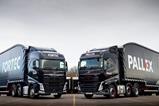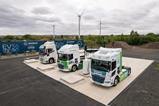The government overlooked the need for low carbon fuels to help the industry transition to a decarbonised future when it announced 54 new HGV charging and hydrogen hubs this week, according to Logistics UK.
The business group acknowledged the significant investment it represented for the industry, but said significant barriers for haulage businesses to achieve net zero still existed.
“It must be recognised that it will take considerable time for zero emission technologies to be fully adopted and integrated into the logistics system,” said Michelle Gardner, Logistics UK deputy policy director.
“While the new charging and refuelling hubs for HGVs are welcome, infrastructure will be needed at scale to keep our industry and the goods we deliver moving across the country and around the world.
“Given this, urgent support must be given to the use and production of low carbon fuels across logistics transport.
“While the long-term goal is zero emission technologies, LCFs can play a key role in the interim.
“Fuels such as hydrotreated vegetable oil can be used in diesel engines without any modifications meaning the industry could effectively reduce carbon emissions by 80% overnight.”
Future of roads minister Lilian Greenwood MP said the move to zero emission HGVs required Britain’s freight industry to stay competitive and resilient and the infrastructure hubs would be strategically located across the UK with a mixture of semi-public depot charging and public charging on motorways and A-roads.


















